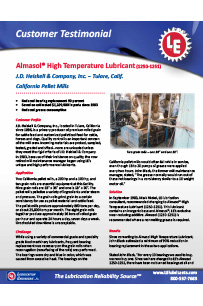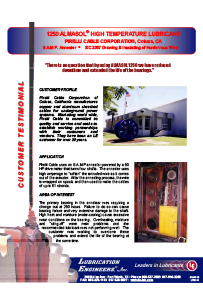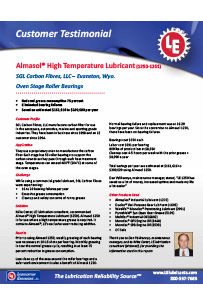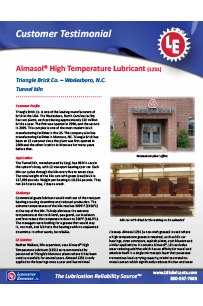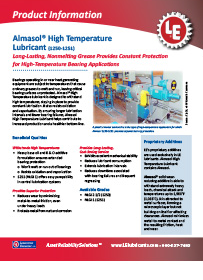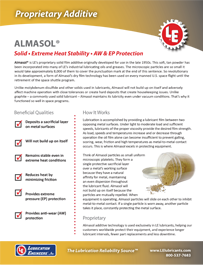- Home
- Lubrication
Systems - Lubricants
& Fluids - Lubrication
Equipment- GREASE PUMPS-Electric (Yamada)
- GREASE PUMPS-Air More--->
- GREASE GUNS More--->
- Quick Release Grease Coupler (Meclube)
- OIL PUMPSMore--->
- HOSE AND REELS More--->
- LUBRICATION CARTS (Samson)
- Engine Crankcase DRAINS
- USED OIL DRAINS (Samson)
- XPEL OIL CONTAINERS
- BULK STORAGE SYSTEMS More--->
- Lube System Filling Options
- Showcase
- Contamination
Control - Condition
Monitoring - Services &
Training
![]()
Lubrication Technologies
Your Professional Lubrication Management Team.
Lubrication Technologies, Inc.
120 BOSWORTH ST.
WEST SPRINGFIELD • MA 01089
August 25, 2016
1250 - 1251 ALMASOL® HIGH TEMPERATURE LUBRICANT GREASET
Long-Lasting, Nonmelting Grease Provides Constant Protection for High-Temperature Bearing Applications
Bearings operating in or near heat-generating equipment are subject to temperatures that cause ordinary greases to melt and run, leaving critical bearing surfaces unprotected. Almasol® High Temperature Lubricant is designed to withstand high temperatures, staying in place to provide constant lubrication. It also resists oxidation and vaporization. By ensuring longer lubrication intervals and fewer bearing failures, Almasol High Temperature Lubricant helps contribute to increased production and a healthier bottom line.
Beneficial Qualities
Withstands High Temperatures
- Heavy base oil and R & O additive formulation ensures extended bearing protection
- Won’t melt or run out of bearings
- Resists oxidation and vaporization
- 1251 (NLGI 1) offers easy pumpability in central lubrication systems
Provides Superior Protection
- Reduces wear by minimizing metal-to-metal friction, even under heavy loads
- Protects metal from rust and corrosion
Provides Long-Lasting, Cost-Saving Service
- Exhibits excellent mechanical stability
- Reduces lubricant consumption
- Extends lubrication intervals
- Reduces downtime associated with bearing failures and frequent regreasing
Available Grades
- NLGI 2 1/2 (1250)
- NLGI 1 (1251)
Typical Applications
- High-temperature applications, including: asphalt plants, brick/ceramic kilns, exhaust fans, kiln car bearings, lime kilns, oven conveyors, pellet mills, plastics and soot blowers

